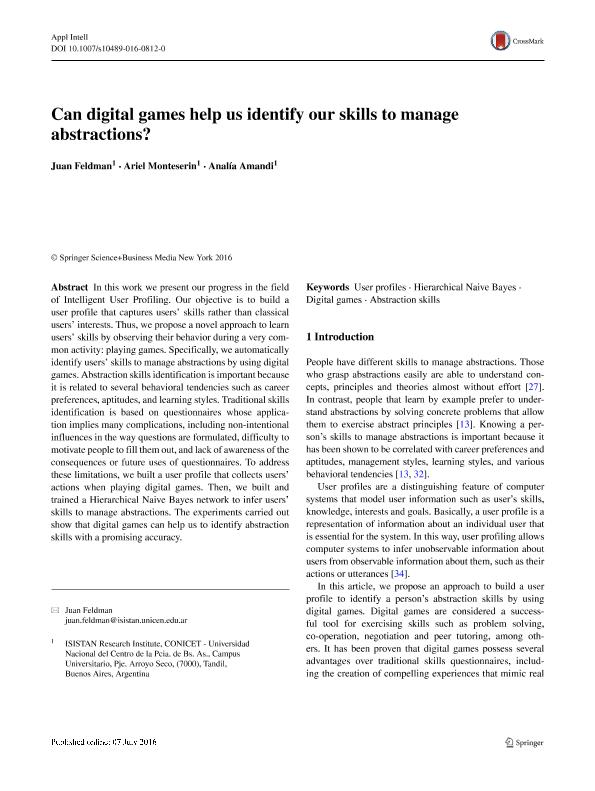Mostrar el registro sencillo del ítem
dc.contributor.author
Feldman, Juan

dc.contributor.author
Monteserin, Ariel José

dc.contributor.author
Amandi, Analia Adriana

dc.date.available
2018-09-06T18:50:24Z
dc.date.issued
2016-12
dc.identifier.citation
Feldman, Juan; Monteserin, Ariel José; Amandi, Analia Adriana; Can digital games help us identify our skills to manage abstractions?; Springer; Applied Intelligence; 45; 4; 12-2016; 1103-1118
dc.identifier.issn
0924-669X
dc.identifier.uri
http://hdl.handle.net/11336/58573
dc.description.abstract
In this work we present our progress in the field of Intelligent User Profiling. Our objective is to build a user profile that captures users’ skills rather than classical users’ interests. Thus, we propose a novel approach to learn users’ skills by observing their behavior during a very common activity: playing games. Specifically, we automatically identify users’ skills to manage abstractions by using digital games. Abstraction skills identification is important because it is related to several behavioral tendencies such as career preferences, aptitudes, and learning styles. Traditional skills identification is based on questionnaires whose application implies many complications, including non-intentional influences in the way questions are formulated, difficulty to motivate people to fill them out, and lack of awareness of the consequences or future uses of questionnaires. To address these limitations, we built a user profile that collects users’ actions when playing digital games. Then, we built and trained a Hierarchical Naive Bayes network to infer users’ skills to manage abstractions. The experiments carried out show that digital games can help us to identify abstraction skills with a promising accuracy.
dc.format
application/pdf
dc.language.iso
eng
dc.publisher
Springer

dc.rights
info:eu-repo/semantics/openAccess
dc.rights.uri
https://creativecommons.org/licenses/by-nc-sa/2.5/ar/
dc.subject
Abstraction Skills
dc.subject
Digital Games
dc.subject
Hierarchical Naive Bayes
dc.subject
User Profiles
dc.subject.classification
Ciencias de la Computación

dc.subject.classification
Ciencias de la Computación e Información

dc.subject.classification
CIENCIAS NATURALES Y EXACTAS

dc.title
Can digital games help us identify our skills to manage abstractions?
dc.type
info:eu-repo/semantics/article
dc.type
info:ar-repo/semantics/artículo
dc.type
info:eu-repo/semantics/publishedVersion
dc.date.updated
2018-09-05T15:54:16Z
dc.identifier.eissn
1573-7497
dc.journal.volume
45
dc.journal.number
4
dc.journal.pagination
1103-1118
dc.journal.pais
Alemania

dc.journal.ciudad
Berlín
dc.description.fil
Fil: Feldman, Juan. Consejo Nacional de Investigaciones Científicas y Técnicas. Centro Científico Tecnológico Conicet - Tandil. Instituto Superior de Ingeniería del Software. Universidad Nacional del Centro de la Provincia de Buenos Aires. Instituto Superior de Ingeniería del Software; Argentina
dc.description.fil
Fil: Monteserin, Ariel José. Consejo Nacional de Investigaciones Científicas y Técnicas. Centro Científico Tecnológico Conicet - Tandil. Instituto Superior de Ingeniería del Software. Universidad Nacional del Centro de la Provincia de Buenos Aires. Instituto Superior de Ingeniería del Software; Argentina
dc.description.fil
Fil: Amandi, Analia Adriana. Consejo Nacional de Investigaciones Científicas y Técnicas. Centro Científico Tecnológico Conicet - Tandil. Instituto Superior de Ingeniería del Software. Universidad Nacional del Centro de la Provincia de Buenos Aires. Instituto Superior de Ingeniería del Software; Argentina
dc.journal.title
Applied Intelligence

dc.relation.alternativeid
info:eu-repo/semantics/altIdentifier/url/http://link.springer.com/article/10.1007/s10489-016-0812-0
dc.relation.alternativeid
info:eu-repo/semantics/altIdentifier/doi/http://dx.doi.org/10.1007/s10489-016-0812-0
Archivos asociados
